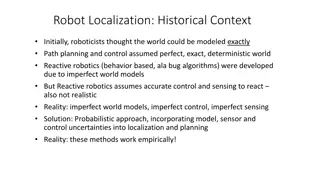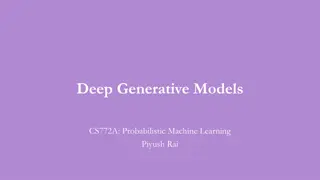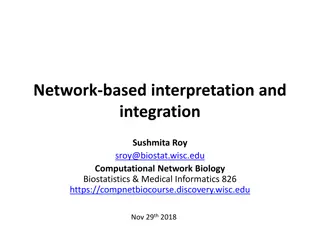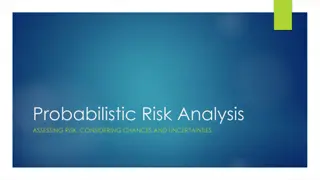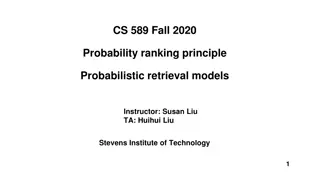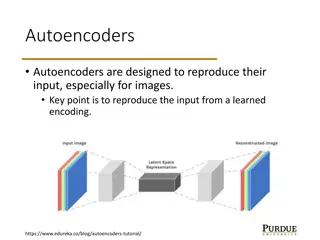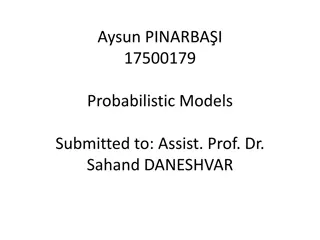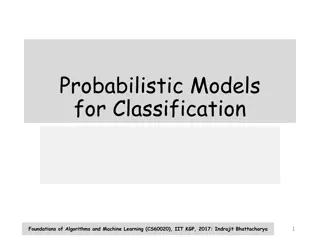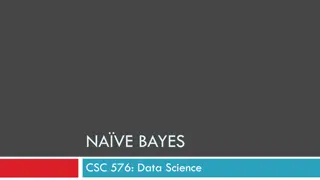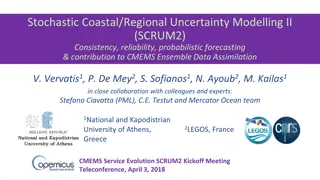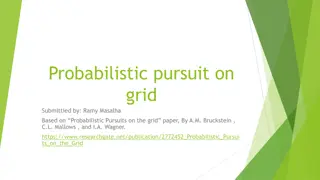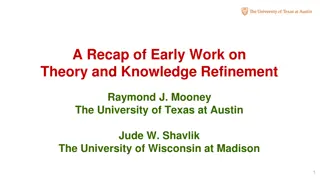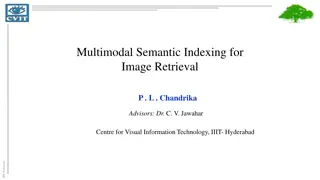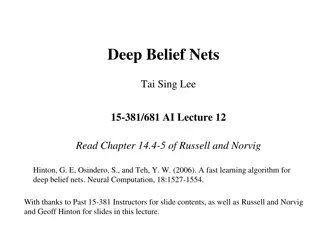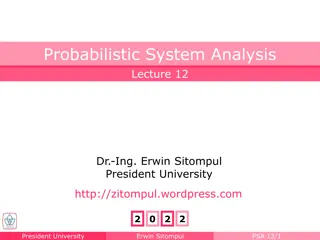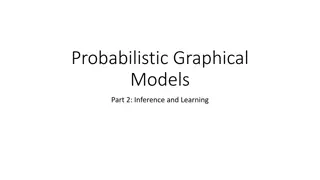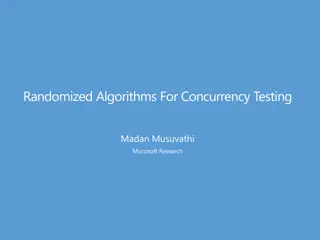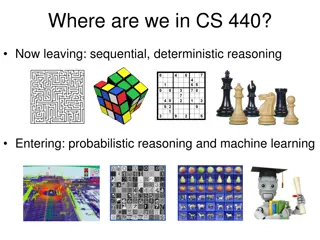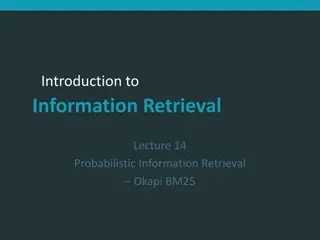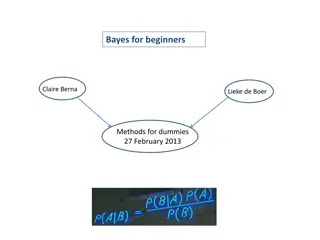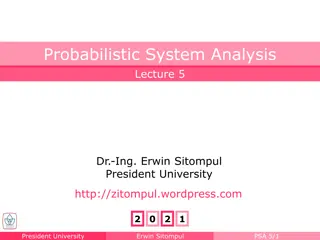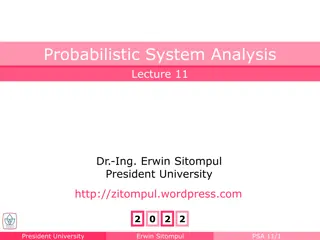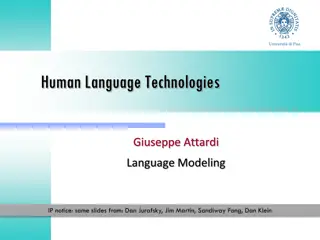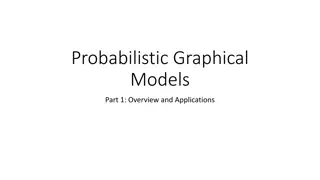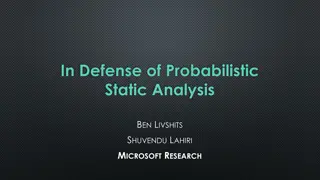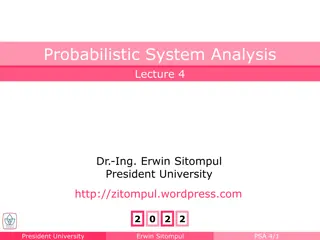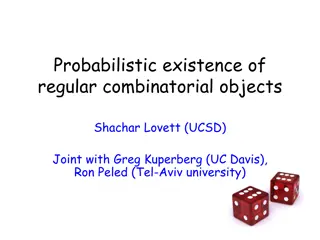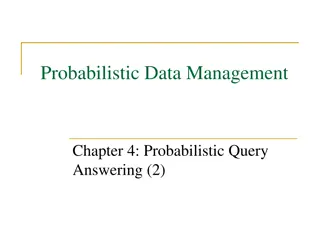Evolution of Robot Localization: From Deterministic to Probabilistic Approaches
Roboticists initially aimed for precise world modeling leading to perfect path planning and control concepts. However, imperfections in world models, control, and sensing called for a shift towards probabilistic methods in robot localization. This evolution from reactive to probabilistic robotics ha
3 views • 36 slides
Understanding Deep Generative Models in Probabilistic Machine Learning
This content explores various deep generative models such as Variational Autoencoders and Generative Adversarial Networks used in Probabilistic Machine Learning. It discusses the construction of generative models using neural networks and Gaussian processes, with a focus on techniques like VAEs and
9 views • 18 slides
Probabilistic Approach for Solving Burnup Problems in Nuclear Transmutations
This study presents a probabilistic approach for solving burnup problems in nuclear transmutations, offering a new method free from the challenges of traditional approaches. It includes an introduction to burnup equations, outlines of the methodology, and the probabilistic method's mathematical form
8 views • 21 slides
Understanding Network Perturbations in Computational Biology
Network-based interpretation and integration play a crucial role in understanding genetic perturbations in biological systems. Perturbations in networks can affect nodes or edges, leading to valuable insights into gene function and phenotypic outcomes. Various algorithms, such as graph diffusion and
0 views • 55 slides
Understanding Probabilistic Risk Analysis: Assessing Risk and Uncertainties
Probabilistic Risk Analysis (PRA) involves evaluating risk by considering probabilities and uncertainties. It assesses the likelihood of hazards occurring using reliable data sources. Risk is the probability of a hazard happening, which cannot be precisely determined due to uncertainties. PRA incorp
2 views • 12 slides
Understanding Probabilistic Retrieval Models and Ranking Principles
In CS 589 Fall 2020, topics covered include probabilistic retrieval models, probability ranking principles, and rescaling methods like IDF and pivoted length normalization. The lecture also delves into random variables, Bayes rules, and maximum likelihood estimation. Quiz questions explore document
0 views • 53 slides
Exploring Monte Carlo Simulations and Probabilistic Techniques
Dive into the world of Monte Carlo simulations and probabilistic methods, understanding the basic principles, the Law of Large Numbers, Pseudo-Random Number Generators, and practical Monte Carlo steps. Explore topics like conditional probability, basic geometry, and calculus through engaging exercis
3 views • 10 slides
Understanding Variational Autoencoders (VAE) in Machine Learning
Autoencoders are neural networks designed to reproduce their input, with Variational Autoencoders (VAE) adding a probabilistic aspect to the encoding and decoding process. VAE makes use of encoder and decoder models that work together to learn probabilistic distributions for latent variables, enabli
6 views • 11 slides
Understanding Probabilistic Models: Examples and Solutions
This content delves into probabilistic models, focusing on computing probabilities by conditioning, independent random variables, and Poisson distributions. Examples and solutions are provided to enhance understanding and application. It covers scenarios such as accidents in an insurance company, ge
0 views • 12 slides
Foundations of Probabilistic Models for Classification in Machine Learning
This content delves into the principles and applications of probabilistic models for binary classification problems, focusing on algorithms and machine learning concepts. It covers topics such as generative models, conditional probabilities, Gaussian distributions, and logistic functions in the cont
0 views • 32 slides
Efficient Voting via Top-k Elicitation Scheme: A Probabilistic Approach
This work presents a probabilistic approach for efficient voting through the top-k elicitation scheme, focusing on communication-efficient group decision-making. The goal is to select the best outcome while minimizing the extraction of excessive information from committee members. The study explores
0 views • 18 slides
Understanding Naive Bayes Classifier in Data Science
Naive Bayes classifier is a probabilistic framework used in data science for classification problems. It leverages Bayes' Theorem to model probabilistic relationships between attributes and class variables. The classifier is particularly useful in scenarios where the relationship between attributes
1 views • 28 slides
Probabilistic Public Key Encryption with Equality Test Overview
An exploration of Probabilistic Public Key Encryption with Equality Test (PKE-ET), discussing its concept, applications, security levels, and comparisons with other encryption schemes such as PKE with Keyword Search and Deterministic PKE. The PKE-ET allows for perfect consistency and soundness in en
3 views • 17 slides
Probabilistic Tsunami Hazard Assessment Project for the NEAM Region
The project, coordinated by Istituto Nazionale di Geofisica e Vulcanologia (INGV) with various partners, aims to develop a region-wide Probabilistic Tsunami Hazard Assessment (PTHA) for the North East Atlantic and Mediterranean coastlines. It involves creating PTHA database and maps, engaging intern
0 views • 10 slides
Stochastic Coastal Regional Uncertainty Modelling II (SCRUM2) Overview
SCRUM2 project aims to enhance CMEMS through regional/coastal ocean-biogeochemical uncertainty modelling, ensemble consistency verification, probabilistic forecasting, and data assimilation. The research team plans to contribute significant advancements in ensemble techniques and reliability assessm
0 views • 28 slides
Probabilistic Pursuit on Grid: Convergence and Shortest Paths Analysis
Probabilistic pursuit on a grid involves agents moving towards a target in a probabilistic manner. The system converges quickly to find the shortest path on the grid from the starting point to the target. The analysis involves proving that agents will follow monotonic paths, leading to efficient con
0 views • 19 slides
Evolution of Theory and Knowledge Refinement in Machine Learning
Early work in the 1990s focused on combining machine learning and knowledge engineering to refine theories and enhance learning from limited data. Techniques included using human-engineered knowledge in rule bases, symbolic theory refinement, and probabilistic methods. Various rule refinement method
0 views • 12 slides
Multimodal Semantic Indexing for Image Retrieval at IIIT Hyderabad
This research delves into multimodal semantic indexing methods for image retrieval, focusing on extending Latent Semantic Indexing (LSI) and probabilistic LSI to a multi-modal setting. Contributions include the refinement of graph models and partitioning algorithms to enhance image retrieval from tr
1 views • 28 slides
Introduction to Deep Belief Nets and Probabilistic Inference Methods
Explore the concepts of deep belief nets and probabilistic inference methods through lecture slides covering topics such as rejection sampling, likelihood weighting, posterior probability estimation, and the influence of evidence variables on sampling distributions. Understand how evidence affects t
0 views • 47 slides
Statistical Inference and Estimation in Probabilistic System Analysis
This content discusses statistical inference methods like classical and Bayesian approaches for making generalizations about populations. It covers estimation problems, hypothesis testing, unbiased estimators, and efficient estimation methods in the context of probabilistic system analysis. Examples
0 views • 30 slides
Efficient Top-k Query Processing Using Probabilistic Utility Functions
This paper presents a method for determining which cars to display on an online car selling service based on users' utility functions. It explores the use of probabilistic utility functions to identify cars that users would be interested in, addressing limitations of traditional top-k and skyline qu
0 views • 28 slides
Probabilistic Graphical Models Part 2: Inference and Learning
This segment delves into various types of inferences in probabilistic graphical models, including marginal inference, posterior inference, and maximum a posteriori inference. It also covers methods like variable elimination, belief propagation, and junction tree for exact inference, along with appro
0 views • 33 slides
Understanding Probabilistic Concurrency Testing for Bug Detection
Explore the concept of probabilistic concurrency testing and how randomized scheduling algorithms can help detect bugs efficiently. Learn about bug depth, randomized algorithms, and the development of PCT to improve the effectiveness of stress testing tools like Cuzz.
0 views • 23 slides
Challenges and Solutions in Concurrency Testing with Randomized Algorithms
Concurrency testing in complex cloud services presents challenges such as bugs, performance problems, and data loss. Randomized algorithms, like Probabilistic Concurrency Testing (PCT), offer effective bug-finding solutions. PCT provides probabilistic guarantees and scalable bug detection for distri
0 views • 37 slides
Introduction to Probabilistic Reasoning and Machine Learning in CS440
Transitioning from sequential, deterministic reasoning, CS440 now delves into probabilistic reasoning and machine learning. The course covers key concepts in probability, motivates the use of probability in decision making under uncertainty, and discusses planning scenarios with probabilistic elemen
0 views • 42 slides
Overview of Probabilistic Roadmaps for Path Planning
Exploring the concept of Probabilistic Roadmaps (PRMs) for efficient path planning in dynamic environments. The approach involves constructing a roadmap through uniform sampling, allowing for multiple queries in the same environment. Key aspects covered include completeness, challenges with classic
0 views • 35 slides
Understanding Probabilistic Information Retrieval: Okapi BM25 Model
Probabilistic Information Retrieval plays a critical role in understanding user needs and matching them with relevant documents. This introduction explores the significance of using probabilities in Information Retrieval, focusing on topics such as classical probabilistic retrieval models, Okapi BM2
0 views • 27 slides
Introduction to Bayes' Rule: Understanding Probabilistic Inference
An overview of Bayes' rule, a fundamental concept in probabilistic inference, is presented in this text. It explains how to calculate conditional probabilities, likelihoods, priors, and posterior probabilities using Bayes' rule through examples like determining the likelihood of rain based on a wet
0 views • 21 slides
Understanding Variance and Covariance in Probabilistic System Analysis
Variance and covariance play crucial roles in probabilistic system analysis. Variance measures the variability in a probability distribution, while covariance describes the relationship between two random variables. This lecture by Dr. Erwin Sitompul at President University delves into these concept
1 views • 30 slides
Probabilistic System Analysis and Sampling Distribution
Lecture 11 by Dr.-Ing. Erwin Sitompul from President University covers topics such as the sampling distribution of S2, chi-squared distribution, and t-distribution. Detailed explanations and examples are provided to understand variance, statistics, and inferences in probabilistic systems analysis. P
0 views • 28 slides
Understanding Cross-Device Tracking for Better Engagement
Delve into the world of cross-device tracking with insights on probabilistic vs. deterministic matching models, limitations of third-party cookies, reasons to engage in cross-device tracking, and the distinctions between probabilistic and deterministic matching methods. Explore how tracking across m
0 views • 41 slides
Understanding Language Modeling: An Overview of Probabilistic Models and Applications
Dive into the world of language modeling with a focus on probabilistic models like N-grams, the Chain Rule, and Shannon Visualization Method. Explore the importance of assigning probabilities to textual data for tasks such as machine translation, spell correction, speech recognition, and more. Disco
0 views • 79 slides
Comprehensive Overview of OSCAR v3.1: A Compact Earth System Model with CMIP6 Simulations
Showcasing the compact Earth system model OSCAR v3.1 and its CMIP6 simulations. OSCAR is a reduced-form Earth system model calibrated to emulate complex models, focusing on radiative forcing, temperatures, precipitation, ocean heat content, aerosols, ozone, and more. Historical periods and scenarios
0 views • 15 slides
Understanding Probabilistic Graphical Models in Real-world Applications
Probabilistic Graphical Models (PGMs) offer a powerful framework for modeling real-world uncertainties and complexities using probability distributions. By incorporating graph theory and probability theory, PGMs allow flexible representation of large sets of random variables with intricate relations
1 views • 30 slides
Benefits of Probabilistic Static Analysis for Improving Program Analysis
Probabilistic static analysis offers a novel approach to enhancing the accuracy and usefulness of program analysis results. By introducing probabilistic treatment in static analysis, uncertainties and imprecisions can be addressed, leading to more interpretable and actionable outcomes. This methodol
0 views • 11 slides
Benchmarking Study of Probabilistic Fracture Mechanics Codes for Piping
This study presents the preliminary results of a benchmarking study on probabilistic fracture mechanics (PFM) codes for piping systems conducted by KINS and CRIEPI. The study aims to improve understanding, recommend best practices, and identify unexpected code behaviors for future enhancements. The
1 views • 37 slides
Understanding Probabilistic System Analysis with Dr. Erwin Sitompul
Explore an in-depth discussion on probabilistic system analysis in these lectures by Dr. Erwin Sitompul from President University. Topics include random variables, probability distributions, mathematical expectation, and more. Gain insights into calculating probabilities and expected values for cont
0 views • 17 slides
Probabilistic Existence of Regular Combinatorial Objects
Shachar Lovett from UCSD, along with Greg Kuperberg from UC Davis, and Ron Peled from Tel-Aviv University, explore the probabilistic existence of regular combinatorial objects like regular graphs, hyper-graphs, and k-wise permutations. They introduce novel probabilistic approaches to prove the exist
0 views • 46 slides
Understanding Probabilistic Weather Information in Aircraft Safety Recommendations
Subcommittee on Aircraft Safety (SAS) emphasizes the importance of understanding probabilistic weather information for better operational decisions in aviation. Recommendations include leveraging existing knowledge and conducting studies to improve user understanding and decision-making processes re
0 views • 12 slides
Understanding Probabilistic Query Answering and Group Nearest Neighbor Queries
This chapter delves into probabilistic query types, focusing on probabilistic group nearest neighbor queries. Explore the definitions, processing techniques, and applications of such queries. Learn how probabilistic data management plays a crucial role in uncertain databases, spatial queries, and mo
0 views • 34 slides
